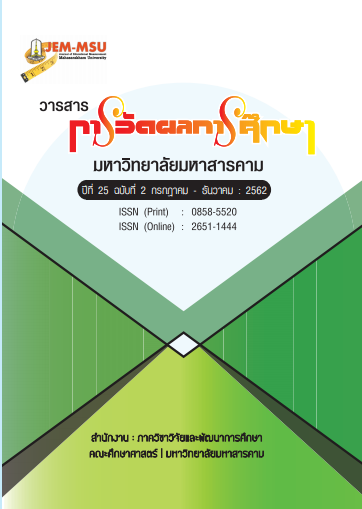The Effects of Using Cognitive Coaching Process Incorporating Metacognitive Strategies for Enhancing Research Competences of Teachers in Prasarnmit Demonstration School (Secondary), Srinakharinwirot University
Main Article Content
Abstract
The objectives of this research were: 1) to compare the research competences in the cognitive domain and the affective domain before the treatment, after the treatment, and during the follow-up period; 2) to compare the research competences in the psychomotor domain after the treatment with the criterion of 80 percent. The research was carried out in time series design with 22 subjects for 20 hours. The research instruments comprised the cognitive coaching process incorporating metacognitive strategies, the competence test for the cognitive domain, the evaluation form for the psychomotor domain, and the affective test for the affective domain. The quantitative data analysis employed Repeated Measures MANOVA and One-Sample t-test. The findings were: 1) the average scores of research competences in the cognitive domain and the affective domain before the treatment, after the treatment, and during the follow-up, differed with statistical significance at the level of .05 and tended to increase steadily; and 2) the average score of the research competence in the psychomotor domain was higher than the criterion with statistical significance at the level of .05.
Article Details
The content and information contained in the published article in the Journal of Educational Measurement Mahasarakham University represent the opinions and responsibilities of the authors directly. The editorial board of the journal is not necessarily in agreement with or responsible for any of the content.
The articles, data, content, images, etc. that have been published in the Journal of Educational Measurement Mahasarakham University are copyrighted by the journal. If any individual or organization wishes to reproduce or perform any actions involving the entirety or any part of the content, they must obtain written permission from the Journal of Educational Measurement Mahasarakham University.
References
กรองทอง จิรเดชากุล. (2550). คู่มือการนิเทศภายในโรงเรียน. กรุงเทพฯ: ธารอักษร.
เฉลิมชัย พันธ์เลิศ. (2549). การพัฒนากระบวนการเสริมสมรรถภาพการชี้แนะของนักวิชาการพี่เลี้ยงโดยใช้การเรียนรู้แบบเน้นประสบการณ์ในการอบรมโดยใช้โรงเรียนเป็นฐาน. วิทยานิพนธ์ ค.ด. (หลักสูตร และการสอน).กรุงเทพฯ: บัณฑิตวิทยาลัย จุฬาลงกรณ์มหาวิทยาลัย.
ทัศนีย์ จารุสมบัติ. (2556). บนเส้นทางสู่การเป็นโค้ชเพื่อการเปลี่ยนแปลง. นครปฐม: ศูนย์จิตตปัญญาศึกษา มหาวิทยาลัยมหิดล.
ทิศนา แขมมณี, ศรินธร วิทยสิรินันท์, และปัทมศิริ ธีรานุรักษ์. (2553). ศาสตร์การสอน องค์ความรู้เพื่อการ จัดกระบวนการเรียนรู้ที่มีประสิทธิภาพ. กรุงเทพฯ:จุฬาลงกรณ์มหาวิทยาลัย.
ธนา นิลชัยโกวิทย์ และอดิศร จันทรสุข. (2552). ศิลปะการจัดกระบวนการเรียนรู้เพื่อการเปลี่ยนแปลง: คู่มือกระบวนการจิตตปัญญา. นครปฐม: ศูนย์จิตตปัญญาศึกษา มหาวิทยาลัยมหิดล.
ธัญพร ชื่นกลิ่น. (2553). การพัฒนารูปแบบการโค้ชเพื่อพัฒนาสมรรถนะการจัดการเรียนรู้ของอาจารย์พยาบาลที่ส่งเสริมทักษะการคิดอย่างมีวิจารณญาณของนักศึกษาพยาบาลในสังกัดสถาบันพระบรมราชชนกกระทรวงสาธารณสุข. วิทยานิพนธ์ ปร.ด.(หลักสูตรและการสอน). นครปฐม: บัณฑิต วิทยาลัย มหาวิทยาลัยศิลปากร.
นงลักษณ์ วิรัชชัย. (2555). วิธีการที่ถูกต้องและทันสมัยในการกำหนดขนาดตัวอย่าง. เอกสารประกอบการบรรยายในโครงการ Research Zone จัดโดยศูนย์การเรียนรู้ทางการวิจัย ณ อาคารศูนย์การเรียนรู้ทางการวิจัย สำนักงานคณะกรรมการการวิจัยแห่งชาติ (วช.) วันที่ 26 มกราคม 2555 เวลา 9.00 – 12.00.
ปรียาพร วงศ์อนุตรโรจน. (2548). การนิเทศการสอน. กรุงเทพฯ: ศูนย์สื่อเสริมกรุงเทพฯ.
พิมพ์พันธ์ เดชะคุปต์. (2560). ทักษะ ๗C ของครู ๔.๐. กรุงเทพฯ: โรงพิมพ์แห่งจุฬาลงกรณ์มหาวิทยาลัย.
พิษณุ ฟองศรี. (2551 ).วิจัยชั้นเรียน : หลักการและเทคนิคปฏิบัติ (พิมพ์ครั้งที่ 7). กรุงเทพฯ : บริษัทด่านสุทธาการพิมพ์ จำกัด.
มานิตา ลีโทชวลิต. (2553). การพัฒนากระบวนการจัดการเรียนรู้ตามแนวคิดจิตตปัญญาศึกษาเพื่อพัฒนาครูปฐมวัยในโรงเรียนเรียนรวม. วิทยานิพนธ์ระดับดุษฎีบัณฑิต สาขาวิชาการศึกษาปฐมวัย ภาควิชา หลักสูตรการสอนและเทคโนโลยีการศึกษา จุฬาลงกรณ์มหาวิทยาลัย.
วัชรา เล่าเรียนดี. (2556). ศาสตร์การนิเทศการสอนและการโค้ช การพัฒนาวิชาชีพ: ทฤษฎี กลยุทธ์ สู่การ ปฏิบัติ. นครปฐม: มหาวิทยาลัยศิลปากร.
สำนักงานเลขาธิการสภาการศึกษา. (2560). แผนการศึกษาแห่งชาติ พ.ศ. 2560 – 2579.กรุงเทพฯ: พริกหวาน กราฟฟิค.
Costa, A., & Garmston, R. (2002). Cognitive Coaching: A foundation for renaissance schools The United States of America: Christopher-Gordon Publishers.
Graham, S., & Harris, K.R. (2003). Students with learning disabilities and the process of writing: A meta-analysis of SRSD studies.
Gottesman. (2000). Peer coaching for educators. Lanhan: The Scarecrow.
Hair, J.F.,Black, W.C.,Babin, B.J. and Anderson, R.E. (2010). Multivariate data analysis a global perspective. (7th ed.). Upper Saddle River, NJ: Prentice Hall.
Joyce, V., & Showers, B. (Producer). (2003). Student achievement through staff development Retrieved from http://test.updc.org/asset/files/professional_development/umta/lf/ randd-engaged-joyce.pdf
Maskey, Cynthia L. (2009). Cognitive Coaching has an Exciting Place in Nursing Education. Teaching and Learning. Nursing Education Academic Journal. 4(2): 63-65.
Rush, D.D., & Shelden, M.L.L. (2011). The Early Childhood Coaching Hand book: MD: Paul H. Brookes.
Sardo–Brown, D., Welsh, L. A., and Bolton, D. L. (1995). Practical Strategies for Facilitating Classroom Teachers’ Involvement in Action Research. Ed-ucation (Chula Vista, Calif.) 115: 553– 559.
Slavin, R.E., & Davis, N. (2003). Educational psychology: Theory and practice. 7th ed. Boston: Allyn & Bacon.


